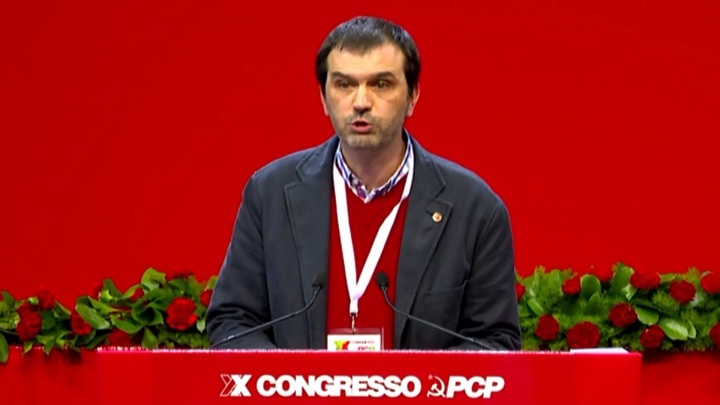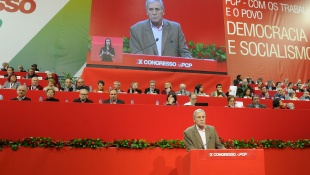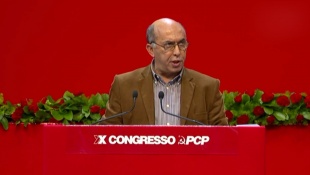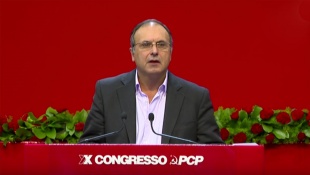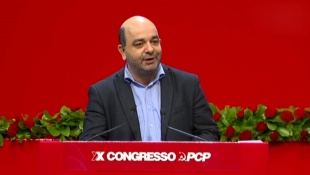In the 90s of the last century, after a decade and a half of the destruction of April’s conquests, from Agrarian Reform to nationalization and workers' rights, the political representatives of triumphant capitalism promised the Portuguese people the effortless kingdom of milk and honey. The textile and footwear sector were dispensable; heavy metallurgy was a burden that needed to be removed; growing cabbages and potatoes was outdated; fishing was obsolete. This band of country sellers, some of whom are still out there, have carried out a meticulous and determined plan of destruction of national production and delivery of our markets to transnational capital.
They shut down companies, privatized the productive sectors, and pushed hundreds of thousands of workers into unemployment. The strategy of right-wing politics and submission to the dictates of the European Union of PSD, CDS and PS is branded in iron in the national reality. Whatever was needed, it was bought abroad, and there are the reasons of high indebtedness and external deficit; the state had to be removed from the economy, to let the sacrosanct markets function, which led to the reduction of public investment, which was not replaced by the private one; It was not necessary to produce, because we would survive of the sun and services, which provoked unsustainable deficits in the productive, technological, capital and demographic plane; it was indispensable to liberalize, deregulate economically, socially and in labor relations, and there we have the weakening of the economic fabric, the decapitalization of companies and the destruction and drainage of capital abroad; foreign investment was essential and there is the loss of national control of strategic sectors.
In the last four years, as a consequence of the brutal worsening of the right-wing policy, with the PECs and the Aggression Pact, the country suffered one of the longest and deepest recessions, with GDP retreating by 6.8pp to pre-2001 levels. The more companies closed (more than 100,000!), the more the country was in debt (23% in the period), with external debt reaching 131% of GDP. However, when we needed growth and public investment policies, then the same sellers put the country under a double burden of deficit and public debt and facing the lack of monetary, exchange and budgetary policy instruments, as a consequence of the accession to the Economic and Monetary Union and the Euro. It is thus that Portugal has the sad record of being, in the last 15 years, one of the 8 countries whose economy has grown the least.
Nor could it be otherwise, when Portugal maintains the highest costs of factors such as credit, energy, or communications, as a consequence of the delivery to private, almost all foreign, of these sectors, when small and medium-sized enterprises are subjected to the authentic dictatorship of the great distribution that crushes them. These servants of capital accepted that Portugal, in the so-called “European Labor Division”, did not fit the modernization or increase of the added value of our production. In fact, it couldn’t be otherwise. The Common Agricultural Policy accentuates the structural problems of Portuguese agriculture, by deregulating markets and productions - from milk quotas to planting rights of the vines - by ensuring that large producer countries have access to the national market, in conjunction with large distribution, while thousands of producers are in ruin forced to abandon their lands.
Whilst the Common Fisheries Policy, despite Portugal having the largest EEZ in the EU and having a fish deficit of more than 1 billion €, penalized small fishermen, who were facing high operating costs, notably in terms of fuels and conditions of sale which were unfavorable, together with a policy of management of resources harmful to national interests. When the manufacturing and extractive industries saw their weight drop significantly in GDP, from 30% to about 14%, and the country loses important centers of strategic decision and skills. And not even the illusion of successful national exports conceal the fact that the trade balance has not been balanced, since most of stock remain mostly low- or medium-technology goods with heavy dependence on imports for their production.
Comrades
In the 1990s, just as before and after, while the dominant bourgeoisie sold the productive capacity in the corridors of Brussels in exchange for power and stewardship, there were those who said no!
There were those who questioned:
- Where would the clothes for the Portuguese people be produced?
- Where would the carriages of our trains be produced?
- Who would build freight vessels for fishing or to explore the many richness of our sea?
- Where would wheat and corn be sown for the bread that would have to continue to feed us?
Yesterday and today, there were those who - the workers and their Party from moment one- stated that here, on this ground, with the Portuguese workers and the people, with another policy, it is not only necessary but possible to ensure the defense and promotion of national production, defending the extractive and manufacturing industry, agriculture and fisheries, placing national resources at the service of the people, the country and reducing structural deficits.
Yesterday as today, we affirm that it is necessary to put Portugal producing, diversifying locations, creating jobs and wages that boost the internal market and put people on their land. Yesterday and today, we advocate a mixed economy in which the public sector coexists with a strong presence in the strategic sectors, the private sector and a dynamic social and cooperative sector, with democratic development planning, decisive public investment and an important role for small and medium-sized enterprises companies. Yesterday and today we state that economic growth, with more production and more employment, will ensure more tax revenues, lower spending and more income in Social Security, and will enable the improvement of the trade balance, with more exports and with the substitution of imports by domestic production, lower budget deficit and less debt. Yesterday as today we say that a country that does not produce, which is dependent on the decisions of third parties to ensure the production of goods and services essential to collective life, cannot claim to be a free and sovereign country. Yesterday and today we remember that the country has resources, has capacities, there are men and women who, with another patriotic and left-wing policy, will be able to unleash the gordian knot of production and put it on the path of development.
Long live the XX Congress of the PCP
Long live the JCP
